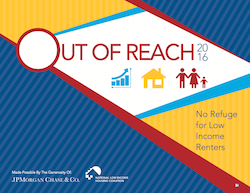
Reforms to the mortgage interest deduction would generate savings that could be invested in the $174 million national Housing Trust Fund announced May 4 to build, preserve or rehabilitate affordable rental housing, potentially including seniors housing, maintains the National Low Income Housing Coalition.
A new report from the coalition, “Out of Reach 2016: No Refuge for Low Income Renters,” found a disparity between rental housing costs and renter income in every jurisdiction across the country, with 14 states — Alaska, California, Colorado, Connecticut, Delaware, Hawaii, Maryland, Massachusetts, New Hampshire, New Jersey, New York, Virginia, Vermont and Washington — as well as the nation’s capital, requiring the highest incomes to afford “a modest two-bedroom apartment.” In those areas, according to the report, renters need an equivalent of full-time hourly wages of $21 to $34, depending on location, to afford such a place.
“We face an alarming and increasing gap between the housing needs of our nation’s lowest income households and what is affordable and available to them,” said Diane Yentel, president and CEO of NLIHC.
“The federal government has the resources to end the shortage of housing affordable to the lowest income families,” she added. “It is simply a matter of how those resources are allocated. Instead of subsidizing the mortgages of higher income people, we must invest in making rental housing more affordable and available to those most in need of assistance.”
Affordable housing issues are affecting low-income older adults in addition to families, wrote Housing and Urban Development Secretary Julian Castro in the report’s preface. “Today, HUD is only able to serve one out of every three seniors who needs our help,” he said. “And Harvard’s Joint Center for Housing Studies calculated that as our nation ages, HUD would need to provide housing support for an additional 900,000 seniors just to keep pace between now and 2030.”
HUD currently provides annual housing support for almost 5.5 million households, Castro said. The new Housing Trust Fund, the Rental Assistance Demonstration project, and incentives such as the low-income housing tax credit are some of “the most important steps we can take to help people succeed today, and live healthier lives long into the future,” he said.
LeadingAge is hoping that some of the $174 million in the Housing Trust Fund will be used for seniors housing.
“States have to use the funds to meet their priority housing needs, and there’s a case to be made in every state that the severe lack of housing affordable to low-income seniors is a priority housing need,” LeadingAge Director Housing Policy and Priorities Linda Couch previously told McKnight’s Senior Living.



